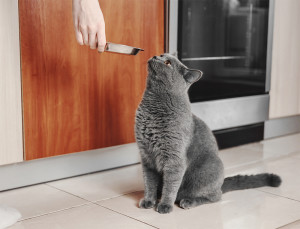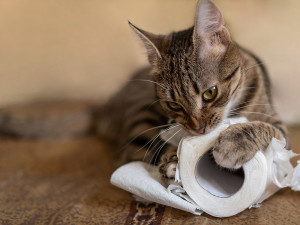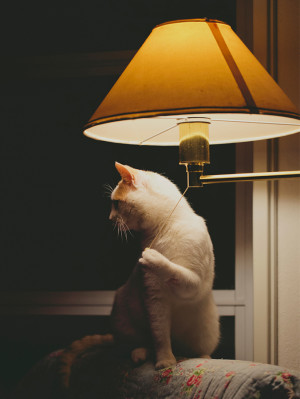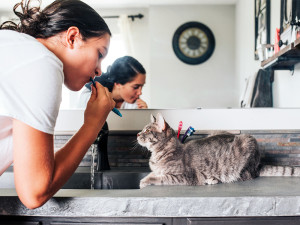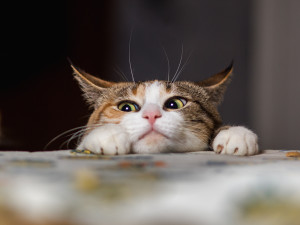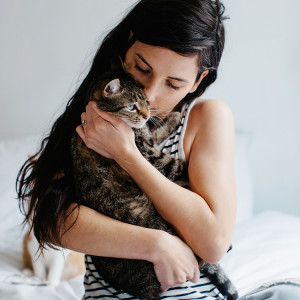Why Does Your Cat Want You to Watch Them Eat
Do they really need an audience?

Share Article
In This Article:
Why Does My Cat Want Me To Watch Them Eat?opens in a new tab Why Does My Cat Stare At Me While Eating?opens in a new tab Are Cats Picky Eaters by Nature?opens in a new tab How to Train Your Cat To Eat Aloneopens in a new tab Frequently Asked Questionsopens in a new tab
Cats can often be finicky, whether it’s about when, how, and what they eatopens in a new tab, or what toys they play with (raise your hand if you’ve spent tons of money on a cat tree, only to have your cat fall in love with a cardboard box). You may even feel sometimes that your cat is judging youopens in a new tab. Some cats simply don’t want to eat unless the dining environment is to their liking — and that may mean they expect you to watch them eat.
This fussy behavior is known as “affection eating,” and it often means that your cat just wants a little company or affection while they snackopens in a new tab. In most cases, this behavior is no reason to worry — your cat likely just feels more comfortable with you around, which is definitely a compliment.
“Some cats are social eaters and prefer to have humans with them when they eat,” Marci Koskiopens in a new tab, certified feline behaviorist and training consultant, says. That social behavior may even extend to other aspects of your cat’s life, such as following you to the bathroomopens in a new tab or waiting for you at the door.
So, should you and your cat start having meals together? Or should you try to encourage them to eat on their own and let you do your own thing?
Why does my cat want me to watch them eat?
Affection eating in cats can manifest in several ways. Your cat may simply enjoy having you present while they eat, or they may be a little reluctant to eat when you’re not in the room. Some cats even prefer to have their human parents pet them during mealtimes. If your cat is a picky eater, this behavior may be extra frustrating. But before you start googling “why my cat only eats when I’m around,” it’s important to understand why your pet is so keen on dinnertime company.
Instinctual behavior
Preferring company while eating may be a natural instinct from your cat’s wilder ancestors and a way of ensuring that they’re safe while eating.
“[Affection eating] could stem from their instinct to avoid predation,” Koski says. “When a cat is eating, their head is down, and they can’t see around them to avoid an approaching predator. But knowing their human is around may help them feel more secure and protected.”
Social bonding
Cats have a reputation for being aloof, but they’re actually strong communicatorsopens in a new tab. Your cat may want you to watch them eat as a way of bonding with you. Cats tend to form strong social bondsopens in a new tab and live in groups, which makes you a part of their little family. Your cat may want you nearby for mealtimes because they feel connected to and safe with you — and even trust you to take proper care of them and feed them wellopens in a new tab.
Learned behavior
Like many behaviors, affection eating can be learned. Your cat may have picked up this habit from other cats in a previous home or shelter environment, and we all know old habits can be hard to break — for cats just as much as humans.
Anxiety or insecurity around eating
Some cats may be more anxious or easily stressed than others and may look for companionship during mealtimes. Try to reduce stressors in your cat’s eating environment so they feel more comfortable and at ease.
Why does my cat stare at me while eating?
If you put down the food bowl just to look up and see a staring cat while they chow down, they may want reassurance. Eating can be a vulnerable time for wild cats, so your pet cat may look to you to guard them while they enjoy a meal. An intense cat stare during suppertime could also be a request for attention opens in a new tabor comfort, and a sign that you have a social eater cat.
Are cats picky eaters by nature?
While every cat is different, overall cats are not naturally picky eatersopens in a new tab. However, an individual cat may develop finicky eating habits because of their natural instincts around food. Wild cats usually survive on small, frequent meals, so your cat may prefer to eat multiple times throughout the day. They may also have a preference for wet food or prefer their meals warmed up.
How to train your cat to eat alone
If your cat wants some company while eating, it’s usually not a cause for concern. However, affection eating can become an issue if your cat won’t eat unless you’re nearby. Cats may also insist on having you close during mealtime because they feel anxious about changes to their environment, like moving to a new place, loud noises, or introducing new pets to the home. Make sure to discuss any changes in your cat’s eating habit with your veterinarian.
Encourage independent eating.
Try to give your cat less attention when they eat. While you can still be in the same room during mealtime, look for activities to do in the area where your cat can still see you but doesn’t have your undivided attention. Doing so can help your cat adjust to being more independent while they eat.
Create a comfortable eating environment.
Make sure to position your cat’s food bowl in a quiet area near other pets or people in your home. With others in sight, they will likely feel less vulnerable when eating. You should also take care of any environmental stressors that could make them anxious, such as loud noises that may startle them during mealtime.
Provide affection outside of eating times.
Always make sure to give your cat plenty of affection outside of meals. Take time to play with your cat, groom them, or just cuddle (if they’re up for it). Your cat may even return the favor with some gentle kneadingopens in a new tab. If your cat feels that they get plenty of attention from you throughout the day, they’re less likely to beg for your attention during dinner.
FAQs
Why is my cat an affection eater?
Every cat has their own personality, and some just prefer company — and attentionopens in a new tab — while eating. This can be a learned behavior, a way of bonding with you, or a result of anxiety.
Does my cat have pica?
Pica is the chewing or eating opens in a new tabof inedible materials and can present in cats who may lack some nutrient in their diet. Other symptoms include vomiting, diarrhea, thirst, constipation, and lethargy.
References
“Cat Behavior Tips.” Regional Animal Services of King County, kingcounty.gov/~/media/depts/regional-animal-services/files/Guides-for-pets/CatBehaviorTips_RASKC.ashx?la=en. Accessed 3 Dec. 2024.
Turner, Dennis C. “The Mechanics of Social Interactions between Cats and Their Owners.” Frontiers in Veterinary Science, vol. 8, 31 Mar. 2021, www.ncbi.nlm.nih.gov/pmc/articles/PMC8044293/, https://doi.org/10.3389/fvets.2021.650143.
Zhang, Lingna, et al. “Feline Communication Strategies When Presented with an Unsolvable Task: The Attentional State of the Person Matters.” Animal Cognition, 2 Apr. 2021, https://doi.org/10.1007/s10071-021-01503-6. Accessed 5 Dec. 2024.
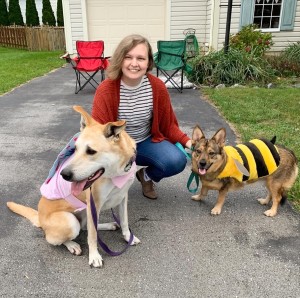
Savannah Admire
Savannah Admire is a writer, poet, and pet mom to three dogs and a cat. She currently lives in Western Maryland. When she’s not writing, you can find her reading, taking photos, or volunteering as a content creator for her local community theatre. Her debut poetry book, Mother Viper, is due out August 12, 2025, and you can follow her on Instagram at @savannahcooperpoetopens in a new tab.
Related articles
- opens in a new tab
Why Does My Cat Meow at Night? (And How to Prevent It)
Just a small request to lower the volume, please.
![White cat switching on lamp on couch]() opens in a new tab
opens in a new tabWhy Does Your Cat Wake You Up at Night?
You want to sleep, your cat wants to party. Here’s how to deal.
- opens in a new tab
Why Does Your Cat Follow You to the Bathroom?
Uh, do you need anything, kitty?
![Cat grabbing onto ledge of table and looking to the left]() opens in a new tab
opens in a new tabWhy Does My Cat Follow Me Everywhere?
Yes, they are right behind you.
![Cat kneading pet parent]() opens in a new tab
opens in a new tabWhy Does My Cat Knead Me?
Among other things, “making biscuits” is a sign of affection. We’re not crying…
![dark-haired woman hugging cat that has imprinted on her]() opens in a new tab
opens in a new tab10 Signs Your Cat Has Imprinted on You
Feeling like you have a little shadow these days? Here’s why that’s happening.

